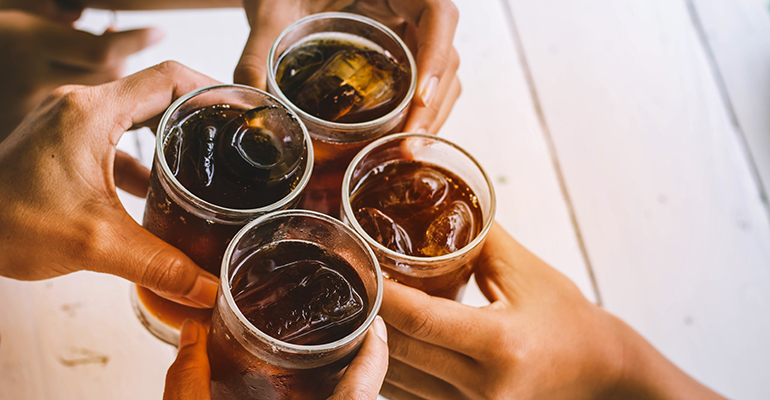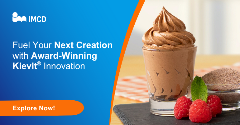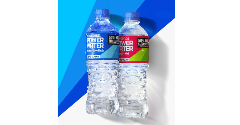News
Young consumers' demand for functional ingredients is driving change in the beverage industry
11 Mar 2024Younger consumers are blurring the boundaries between food and beverage – demanding a wide variety of functional ingredients, but in a drinkable format that compliments their on-the-go lifestyles.
When we think of a green smoothie, we typically think of familiar ingredients like kale, spinach, and avocado. However, insights from HealthFocus International’s 2022 Global Boosted Beverages report reveal certain consumers are increasingly looking beyond the ordinary to ingredients like algae, adaptogens, and hemp for their green fix.

Who are the “Boosted Beverage Consumers”?
Researchers surveyed 12,500 people, across 23 countries (North America, Europe, Middle East and Africa, East Asia Pacific, South Asia, and Latin America) to determine what consumers look for in beverages, finding that hydration is no longer the primary reason people are reaching for beverages.
“Boosted Beverage Consumers” defined by HealthFocus International as consumers who believe beverages can provide the same nutrition as foods and always or usually select beverages for health reasons, were the key consumer group identified in the report.
While having similar priorities to regular consumers, such as opting for beverages that contain low to no sugar, boosted consumers differ in key areas, including a higher interest in protein, plant-based, eco-friendly packaging, and added electrolytes. They are more likely to be under 40 years old and to live in emerging markets, including Vietnam, Nigeria, Thailand, Saudi Arabia, Pakistan, and India.
Julie Johnson, president of HealthFocus International told Ingredients Network: “Younger consumers tend to be more experimental and driven towards anything that can offer a benefit. They’ve grown up with a much wider variety of beverage options, both in flavour and functionality.”
Johnson emphasised that companies looking to trial new products will face fewer barriers targeting products to younger consumers. “On the other hand, older consumers, as a generalisation, tend to be more steadfast in their product purchase behaviour. They’ve learned what they like over time and tend to go back to the same products. When trying to reach these consumers, it’s important to make it fit within their guidelines – something that’s convenient for their lifestyle, a flavour that is familiar […] etc. They are less experimental, so don’t make them stretch too far out of their comfort zone.”
Niche ingredients infiltrating the beverage market
When selecting beverages, boosted consumers prioritise products that address their foremost concerns, such as immunity, energy, and bone health, and are interested in niche and emerging ingredients, including Ayurvedic ingredients, adaptogens, postbiotics, beta-glucan (oat fibre), and bone broth.
The majority are highly interested in beverages with medicinal benefits and hold a strong belief that beverages have the power to provide health benefits beyond sustenance. Johnson attributed the higher number of boosted beverage consumers in the East Asia Pacific markets to the history of the region– where functional ingredients have been a mainstay, meaning consumers are more comfortable with foods and beverages offering functionality.
Functional ingredients are not only making their mark in emerging markets. In the US, the appetite for functional beverages continues to rise, a theme that Brandon Casteel, vice president of partnerships at SPINS, a syndicated data company at the forefront of grocery retail insights, discussed at Fi Europe 2023. Driven by consumers’ heightened focus on health, Casteel brought attention to shifts in categories like soda, where a focus on digestive health was up 102% year-over-year in US retail sales. He pointed to the success of Olipop, a prebiotic soda, and Perfy, an ashwagandha-infused soda, as examples of products experiencing sales growth.
Saskia Hoebée, principal of Five Seasons Ventures, a pan-European Venture Capital fund specialised in food-tech investments, echoed this sentiment. Describing the top trends to look out for in 2024, she wrote: “The soda industry is massive (>$170bn in 2024) and ripe for disruption, because consumers are demanding better products but are not willing to give up on taste and convenience.”
 © iStock/undefined undefined
© iStock/undefined undefined
Companies urged to innovate despite inflation
Although boosted consumers are more likely to live in the East Asia Pacific region, focusing solely on this region may mean missed opportunities.
“There is increased willingness to pay for beverages in Europe, and functionality justifies fetching a premium [price]. […] I expect to see more functional beverages – think gut health, collagen, clean energy – popping up in Europe,” Hoebée said.
As the cost of living continues to climb across the world, the idea of pricing products at a premium, may, on the surface, appear counterintuitive. But that’s exactly what Mike Hughes, head of research and insight at FMCG Gurus, is urging brands to do. Discussing the top ten trends for 2024, he encouraged brands to be innovative: “Value is more important to consumers than the lowest price.”
The three-meals-a-day concept could be replaced by functional products
Innovation is not the only avenue brands can capitalise on. Another top trend identified by FMCG Gurus is the increasing demand for product formats that blur the boundaries between functional and everyday groceries. This is a trend that is already being implemented by boosted consumers: 75% use healthy beverages as replacements for meals or snacks and 72% believe that eating several healthy snacks is as good as or better than eating three meals a day.
Johnson said: “Consumers want it all – convenience, taste, and nutritional benefits. Beverages become a perfect delivery vehicle to provide this trifecta. As eating patterns become much less traditional, functional beverages provide a perfect solution for an on-the-go meal or a snack. Beverages also have the unique ability to push boundaries, both in formulation and consumer trial and acceptance.”
Related news

Oat Barista: Innovation for game-changing beverages
20 Nov 2025
Oat Barista is a clean label, sustainable, and innovative drink base specifically designed to create the perfect foam in one single ingredient.
Read more
How younger consumers are redefining ingredient choices and rejecting brand loyalty
18 Nov 2025
Gen Z and millennial consumers’ preferences for transparency, functionality, and purpose are “redefining the very nature of consumption itself”, says SPINS.
Read more
Hybrid formats and flexible positioning to disrupt category norms in 2026
17 Nov 2025
Trend forecasters expect food and drink to move more fluidly across occasions, functions, and formats as consumers seek versatility, novelty, and convenience.
Read more
Danone highlights digestive health as potential ‘tipping point’ for food industry
13 Nov 2025
Danone is betting on a food industry “tipping point” that will bloat the market for healthy products, particularly those related to gut health.
Read more
New UPF standard hoped to offer consumers ‘coherence and clarity’
10 Nov 2025
Ingredients companies are being urged to enter “a new era of partnership and innovation” following the launch of the industry’s first non-UPF verification scheme.
Read more
Faravelli at Fi Europe: Showcasing FARA® functional solutions for food and nutra
28 Oct 2025
At Fi Europe 2025 in Paris (stand 72M39), Faravelli showcases FARA® Customized Functional Solutions and a wide ingredient portfolio for food and nutra – delivering quality, innovation, and expertise.
Read more
Agrigum Redefined FIBER
27 Oct 2025
Agrigum has transformed gum acacia into a natural, science-backed fibre that supports gut health, sustainability, and innovation across global food and nutrition applications.
Read more
Expanding boundaries in food & beverage innovation
23 Oct 2025
IMCD and FrieslandCampina Professional expand partnership to deliver Kievit® across EMEA, enabling brands to enhance quality and accelerate time-to-market for tomorrow’s food & beverage creations.
Read more
Amazon Grocery launch aims to balance quality with affordability
22 Oct 2025
Global e-commerce giant Amazon has introduced a new private-label food brand, combining existing Amazon Fresh and Happy Belly products with new everyday items.
Read more
Powerade enters hydration space with launch of Power Water
21 Oct 2025
Coca-Cola’s Powerade brand has launched a zero-sugar, electrolyte-enhanced functional water, marking the brand's entry into the hydration space.
Read more